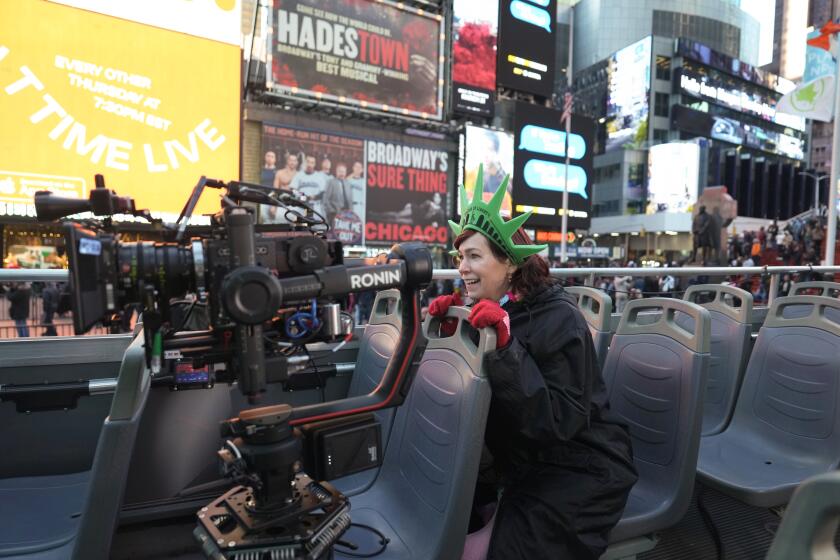Media Consolidation: No Degrees of Separation?
People’s eyes seem to glaze over when you raise the issue of concentrated media ownership--the fact that a few companies now control the lion’s share of what the public sees on TV, radio and in movie theaters. Last week provided a reminder, at least in theory, as to why those glassy eyes should be opened.
A New York Times report suggested that News Corp. Chairman Rupert Murdoch was responsible for cable network FX pulling the plug on a proposed TV movie about the Anita Hill-Clarence Thomas hearings. The implication was that the politically conservative Murdoch killed the project because of his support for Thomas, a conservative Supreme Court justice.
Senior Fox officials staunchly denied that Murdoch played any role in the decision. In a broader sense, however, one can hardly argue with the premise that Murdoch uses his far-flung media holdings--which include 20th Century Fox and the Fox TV network--to further his political and corporate interests, potentially influencing the content of entertainment and news.
The Murdoch-controlled New York Post has made especially pointed targets of his rivals, ridiculing Time Warner Vice Chairman Ted Turner and his wife, Jane Fonda, in addition to running nasty gossip about other executives at rival networks.
News Corp. also owns publisher HarperCollins, which made news in 1994 with a whopping $4.5-million book advance to House Speaker Newt Gingrich (R-Ga.) when Murdoch--a naturalized U.S. citizen--was seeking Congress’ help in gaining approval to acquire TV stations using foreign capital. Gingrich, seeking to defuse the situation, subsequently returned the advance.
Fox News Channel, News Corp.’s 24-hour cable service, contends other media outlets harbor a liberal bias, a point made via the tone of its coverage as well as its promotional slogan, “We report. You decide.” Even if not directed to pursue Murdoch’s agenda, underlings can’t help but know where his sympathies lie.
Media consolidation has made this threat of corporate interest colliding with editorial decision-making increasingly hard to avoid, meaning divisions at these massive communications empires must practice what amounts to “trust me” journalism.
In essence, “trust me” journalism involves situations in which a broadcaster or magazine covers a sister company and implicitly asks consumers to trust they will report the story as if there were no such ties.
Magazines and newspapers usually disclose these potential conflicts by adding a parenthetical note citing the shared corporate parentage. On television, stopping in midsentence to add such qualifiers is understandably awkward.
As a result, incestuous relationships usually go unstated. Time Warner-owned CNN’s entertainment news program “Showbiz Today,” for example, doesn’t refer to its link to Warner Bros. unless a story specifically relates to the corporation. Criticism leveled at the studio for releasing records with explicit rap lyrics would prompt a mention of the connection, but a story about “ER” or a big Warner Bros. film like “Lethal Weapon 4” would not.
“On ‘Showbiz,’ I’ve always approached reporting the story without regard to corporate affiliations, so it usually isn’t necessary to disclose it, because we would never think like that,” said Scott Leon, CNN’s vice president of entertainment news. “We cover everyone’s movies, not just Warner Bros.”
Indeed, few outlets are that diligent. No disclaimers are forthcoming when KABC-TV Channel 7 covers attractions or events at Disneyland, or CBS’ news-radio station KNX-AM passes off thinly veiled commercials for the CBS TV network’s fare as news reports.
Other than the show-ending logo, casual viewers have no reason to suspect “Entertainment Tonight” of keeping things in the family by touting a Paramount movie or a series like “Frasier,” which the studio produces. The same goes for rival “infotainment” shows “Extra” (from Warner Bros.) or “Access Hollywood,” a partnership of NBC and Fox.
“Good Morning America” and “Live With Regis & Kathie Lee” both flogged the opening of Disney’s Animal Kingdom park, just as “The Rosie O’Donnell Show” initially booked an inordinate number of guests associated with its studio, Warner Bros.
Mary Kellogg-Joslyn, senior vice president of current programming for Disney’s Buena Vista Television, stressed that the producers of “Regis & Kathie Lee” recognize the program will suffer if they allow corporate alliances to undermine them in producing the best show they can.
“I am very pro-synergy, but I also know that what must come first is what works for the show,” she said.
Siskel and Ebert Work for Disney
Even America’s two most famous thumb-wavers, film critics Gene Siskel and Roger Ebert, don’t note within their syndicated movie-review show when they are evaluating films from their employer, Disney.
“I don’t notice or remember who the distributor is of the films I see,” Siskel said in an interview from Chicago. “It’s really a nonissue.”
As to whether fans realize he works for Disney, Siskel added, “Do I expect the average person to know that? I don’t know, but I can tell them they don’t have anything to worry about.”
Disney officials have long stated they get no breaks from the pair. If anything, they say, Siskel and Ebert regularly demonstrate their lack of concern about whose ox they gore by panning the studio’s films.
“When we decided we were going to have ‘Siskel & Ebert’ on our programming roster, it was very clear it had to be church and state, and that we could never interfere,” said Kellogg-Joslyn, who’s also responsible for that show. “I’ve never gotten one call from the movie division asking me why Gene and Roger did what they did.”
Certainly, news organizations and even fluffier talk and celebrity shows generally go about their business without fretting about the far-removed entities that own them. Yet when synergy-driven encroachments on their independence surface, it should fire off a warning flare to everyone that room for impropriety exists--even if it’s due merely to an employee’s overzealousness.
Given that risk, wouldn’t it be wise simply to lay bare these conflicts and, to quote Fox, let the viewer decide? Having been around more than 20 years, Siskel and Ebert’s show has doubtless built up a reservoir of respectability, but with a handful of media giants owning everything, can less-established programs be relied upon to match that level of integrity?
Surely, these companies will say, corporate parentage would never color such judgments--just as a cable news network would never air a major report with unsupportable allegations against the U.S. military, or Boston newspaper columnists would never create fictional characters and crib jokes from George Carlin.
Trust us.
More to Read
The biggest entertainment stories
Get our big stories about Hollywood, film, television, music, arts, culture and more right in your inbox as soon as they publish.
You may occasionally receive promotional content from the Los Angeles Times.






